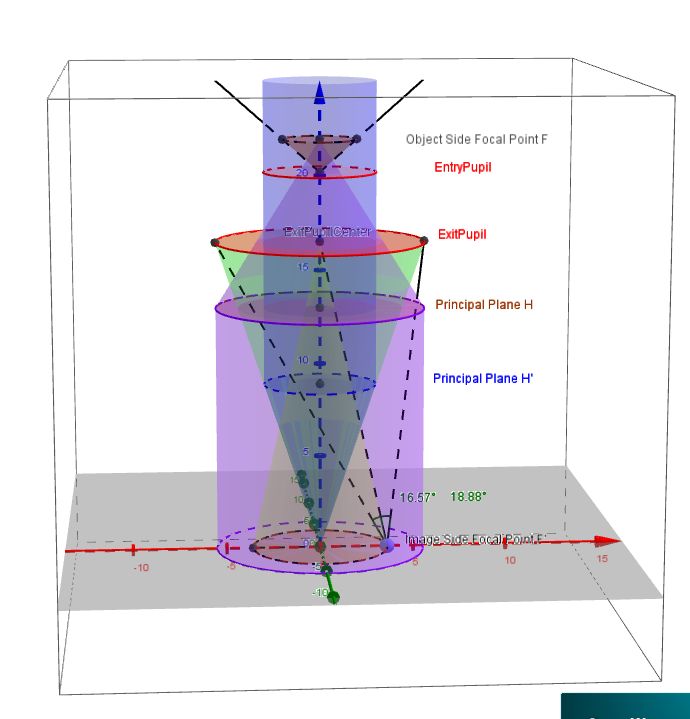What’s the relationship between the main features of a lens?
About the Sense and Nonsense of Resolution
08/23/2016What happens when you focus lenses from infinity to shorter distances?
01/05/2018We describe here the (yes, complicated) relationships between :
- Focal Length
- F-Number (=F#)
- Entry Pupil
- Exit Pupil
- Viewing Angle
- Chief Ray Angle
- Image Circle
- Object side and image side principal planes
Given : focal length, F#, Image circle, CRA
Lets assume the object is at infinity because only there, the F# is defined and the image shall be focussed).
- Determination of the Entry Pupil Diameter (EPD)
The F# is the ratio : focal length / EPD
So EPD = focal length / F#.
All light arriving parallel to the optical axis in a cylinder with this diameter enters the lens and is focussed to “somewhere” on the optical axis. - Determination of the image side Principal plane H’
Per definition, the focal length is the distance of the image side principal plane to the image of an on-axis object point at infinity position.
This image is called Focal point. As the image is focussed, the focal point is located where the optical axis intersects the sensor.
In Practice, this is not necessary the center of the sensor! The sensor might be shifted!
- Determination of the angle under which light arrives in the focal point.
The distance of the image side principal plane H’ and the sensor is the focal length.
We also have the EPD.
From this we can calculate the sine “NA” of half the angle in the focal point as
NA = 1/ 2F#
So arcsin NA is half the angle and 2 arcsin NA is the full angle. - Determination of the Exit Pupil Center “XPC”
Fomr the Chief Ray angle and the image circle we can find the intersection point where the rays arriving at the image circle rim under the angle CRA.
We call this point exit pupil center EPC. - Determination of the Exit Pupil and the Exit Pupil Diameter (“XPD”)
The F# determined the image side NA. we get the exit pupil as intersection of the resulting cone in the distance of the XPC. - Determination of the shallowest and steepest angles under which light arrives at an image point P
P, together with the optical axis defines a plane.
The intersection of this plane with the exit pupil defines a segment where it intersects with the exit pupil. The min / max of the off axis angle (absolute value) of the left and the right segment end points to Pdefine the min and max Angle at which light arrives at P. - Determination of the object side focal point
With the XPD we get an on-axis cylinder of the diameter XPD.
Light arriving from Infinity parallel to the optical axuis inside this cylinder is focussed in the object side focal point F. - Determination of the Object side Principal plane H
the principal plane H is by definition perpendicular to the optical axis through a point that is “focal length” away from the object side focal point. - Determination of the “Object Circle”
If light from various directions arrives from the image side direction exit pupil, then at a plane perpendiculat trough the Object side focal point theres a disk of light we for now call “object circle”. - Determination of the entry pupil center
Half the object side viewing angle is the object side chief ray angle
Where the rays through the rim of the object circle arriving at the Object side chief ray angle meet is the Entry Pupil Center. “EPC”. - Determination of the Entry Pupil
From entry pupil position and diameter we have the Entry Pupil.
All object side ray that are in the field of v iew and go through the entry pupil have an image in the image circle.


